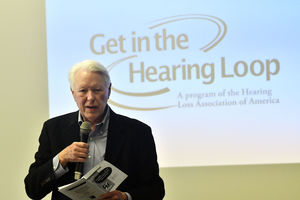Blog
-

Hearing loop at Library opens doors
 26 Dec , 2016
26 Dec , 2016
More than 50 residents, many with hearing loss, heard loud and clear a special presentation this past weekend at North Kingstown Free Library, thanks to newly installed technology at the library that connects to their hearing devices – and helps reconnect the residents to a sense, they feared, was lost for good.
Library staff, along with representatives from the Friends of the North Kingstown Free Library, the Library Trustees, the Rhode Island chapter of the Hearing Loss Association of America and Rhode Island College’s Paul V. Sherlock Center on Disabilities, held a formal program and dedication Saturday afternoon for the new hearing loop installed in the library’s meeting room.
The technology used for the hearing loop is called an induction loop, which is a copper wire encircling the room – specifically the library’s meeting room – and connected to the room’s sound system, transmitting sound electromagnetically. The signal can be picked up directly by the telecoil, or T-coil, embedded in hearing aids having manual T-switches without separate receivers. This technology greatly increases a person’s ability to clearly hear speeches in large venues, such as churches and lecture halls, with minimal background noise.
Such hearing loops are commonplace across Europe – at airports, churches, train stations and taxis – and the U.S. is now catching up to such technology. North Kingstown Free Library is one of the few places in Rhode Island to have this system. A reporter was given a headset with a telecoil to use, and the sound emanating during the two-hour program was quite clear.
“We want to end the day with everyone understanding with the hearing loop, your sound experience is superior to most other ways of hearing,” said David Abell, a retired attorney who is a volunteer for RIHLAA.
Abell presented certificates of appreciation to both Sherlock Center Associate Director Mary Ann Pallack and Friends of the Free Library Vice President Marianne Callahan for their efforts in providing funding. The loop’s approximately $6,000 installation cost was funded through a $2,500 grant from the Sherlock Center, with the Friends group paying the remaining balance, with the additional costs paid by the library’s Board of Trustees.
Saturday’s program included a 50-minute presentation by nationally renowned audiologist Dr. Juliette Sterkins, a leading advocate whose involvement in spreading the word about hearing loops led to the installation of over 560 such loops in Wisconsin since 2008, 30 of them in churches. Along with explaining some common complaints people with hearing loss have – can hear speech, but cannot understand it; conversations sound mumbled; and some voices are hard to hear – Sterkins said the consequences are people have difficulty communicating both at work and at play, reducing quality of life. She said some studies suggest hearing loss can contribute to the onset of dementia.
With a hearing loop installed in large gathering places, background noise and reverberation are decreased, Sterkins said, helping the person hear more clearly. Plus, those who have hearing loss notice a significant difference in their hearing between an area with a loop and a non-looped area.The program included a panel discussion where four panelists were asked what their barriers are with hearing loss and how a hearing loop assists them. Rhode Island Commission for the Deaf and Hard of Hearing Commissioner George “Herk” Herchenroether, who is deaf in one ear and limited in the other, said people still do not fully understand hearing loss and there needs to be more public awareness on the subject. He recalled a visit to Barcelona during which his spirits – and hearing – were lifted when he visited a world-renowned chapel that recently installed a hearing loop.
Source: The Independant
Image credit: Michael Derr





























































































































































































































































































































































































































































































































































































